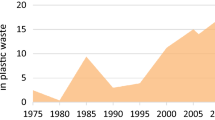Abstract
With over 9 million population, challenges of waste management system (WMS) of Tehran can offer some lessons to other middle-income cities. Despite all the investments and trials, the recycling rate has been almost constant (about 18%) during the last decade. Short-term decisions, lack of true understanding of different parts of the system, and non-participation of other stakeholders are the most important weaknesses of governance of the WMS in Tehran, with inclusivity and financial sustainability that seem to be the most challenging aspects of Tehran’s WMS. Inadequate waste management framework is another weakness of the governance system, which is considered a national challenge. Although the disposal methods have been improved to some extent and the capacity of composting plants have been increased, the quality of 3Rs (reduce, reuse, and recycle) is still very poor. Controlled landfill with daily cover is the main method used for disposal of about 50% of generated wastes.
Graphical abstract



source of generation, collection vehicles and ARAD (Aradkooh recovery and disposal complex)





adopted from Wilson et al. [11]
Similar content being viewed by others
References
UN. Population Division (2018) The World’s cities in 2018 : data booklet
Whiteman A, Smith P, Wilson DC (2001) Waste management : an indicator of urban governance. In: UN-Habitat Global Conference on Urban Development, pp. 1–2.
Cointreau-Levine S (1994) Private sector participation in municipal solid waste services in developing countries, vol. 1. The formal sector. The World Bank, Washington, DC
Scheinberg A, Wilson DC, Rodic-Wiersma L (2010) Solid waste management in the World’s cities: water and sanitation in the World’s cities. UN Habitat -Earthscan, London and Washington DC
Mavropoulos A, Marinheiro L, Cohen P, Law J, Greedy D, Loureiro A, Plimakis S, Bouldry T (2016) A roadmap for closing waste dumpsites: the world’s most polluted places. Austria, Vienna
Turcott Cervantes DE, López Martínez A, Cuartas Hernández M, García Lobo, de Cortázar A (2018) Using indicators as a tool to evaluate municipal solid waste management: a critical review. Waste Manag 80:51–63
Deus RM, Mele FD, Bezerra BS, Battistelle RAG (2020) A municipal solid waste indicator for environmental impact: assessment and identification of best management practices. J Clean Prod 242:118433
Campitelli A, Schebek L (2020) How is the performance of waste management systems assessed globally? A systematic review. J Clean Prod 272:122986
Wilson DC, Scheinberg A (2010) What is good practice in solid waste management? Waste Manag Res 28(12):1055–1056
Wilson DC, Rodic L, Scheinberg A, Velis CA, Alabaster G (2012) Comparative analysis of solid waste management in 20 cities. Waste Manag Res 30(3):237–254
Wilson DC, Rodic L, Cowing MJ, Velis CA, Whiteman AD, Scheinberg A, Vilches R, Masterson D, Stretz J, Oelz B (2015) ‘Wasteaware’ benchmark indicators for integrated sustainable waste management in cities. Waste Manag 35:329–342
Malmir T, Tojo Y (2016) Municipal solid waste management in Tehran: changes during the last 5 years. Waste Manag Res 34(5):449–456
Hoornweg D, Bhada-Tata P (2012) What a waste a global review of solid waste management. Washington DC
Esmaeilizadeh S, Shaghaghi A, Taghipour H (2020) Key informants’ perspectives on the challenges of municipal solid waste management in Iran: a mixed method study. J Mater Cycles Waste Manag 22(4):1284–1298
Abduli MA (1995) Solid waste management in Tehran. Waste Manag Res 13(5):519–531
Velis CA, Wilson DC, Rocca O, Smith SR, Mavropoulos A, Cheeseman CR (2012) An analytical framework and tool (‘InteRa’) for integrating the informal recycling sector in waste and resource management systems in developing countries. Waste Manag Res 30(9):43–66
Wilson DC, Velis C, Cheeseman C (2006) Role of informal sector recycling in waste management in developing countries. Habitat Int 30(4):797–808
Ahmady K (2019) Childhood yawn a study on recognising, preventing and controlling the phenomenon of child scavenging (waste picking) in Tehran. Society for the Protection of Children’s Rights (IRSPRC)
TURPC (2021) Tehran integrated solid waste management plan, Tehran
Coffey M, Coad A (2010) Collection of municipal solid waste in developing countries, second edn. Nairobi, Kenya: United Nations Human Settlements Programme (UN-HABITAT)
Dominic H, Stark W, Callens A, Bogaert G, Christensen EH, Heikkonen V, Ledore A, Stahl H, Economides D, Tsalas A, Favoino E, Ricci M, Carlsson M (2002) Financing and incentive schemes for municipal waste management: case studies, final report to Directorate General Environment, European Commission. Bristol: Eunomia Research & Consulting
Kanat G (2010) Municipal solid-waste management in Istanbul. Waste Manag 30(8–9):1737–1745
Abduli MA, Azimi E (2010) Municipal waste reduction potential and related strategies in Tehran. Int J Environ Res 4(4):901–912
McAllister J (2015) Factors influencing solid-waste management in the developing world
Mahdavi Damghani A, Savarypour G, Zand E, Deihimfard R (2008) Municipal solid waste management in Tehran: current practices, opportunities and challenges. Waste Manag 28:929–934
Acknowledgements
The authors would like to appreciate Sabz Andish Payesh (SAP) Consulting Engineers, Tehran Urban Research & Planning Center (TURPC) and Tehran Waste Management Organization (TWMO) for providing required data.
Author information
Authors and Affiliations
Corresponding author
Ethics declarations
Conflict of interest
The authors also declare that they have no conflict of interests.
Additional information
Publisher's Note
Springer Nature remains neutral with regard to jurisdictional claims in published maps and institutional affiliations.
Supplementary Information
Below is the link to the electronic supplementary material.
Rights and permissions
About this article
Cite this article
Jamialahmadi, N., Hashemi, M. & Jalili Ghazizade, M. Assessment of the current municipal solid waste management system in Tehran, Iran: challenges and opportunities for sustainable development. J Mater Cycles Waste Manag 24, 2054–2067 (2022). https://doi.org/10.1007/s10163-022-01423-8
Received:
Accepted:
Published:
Issue Date:
DOI: https://doi.org/10.1007/s10163-022-01423-8




